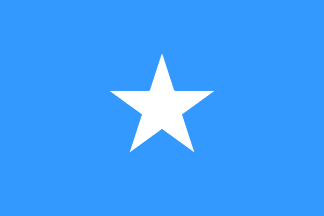Here is a very interesting piece about how the ICU's militias have spread themselves too far apart to survive a real fight.
==================================================
Unless the next round of talks between the Union of Islamist Courts (UIC) of Somalia and the Transitional Federal Government (TFG) - scheduled for October 30 in Khartoum - builds on the uneasy calm that the feuding groups maintained during Ramadan, it will not achieve much.
Talks between the rivals on September 2 ended in a stalemate after the Transitional Government accused the Islamic Courts of having links with the Al Qaeda terrorist organisation; in turn, the Islamists accused the Transitional Government of being a stooge of the Ethiopian government.
For many Somalis, it was enough that the two sides deliberately avoided squabbling war in the holy month of Ramadan, which ends this week.
But if there is no breakthrough in the third round of talks, war seems inevitable.
The reality of Somalia's landscape, however, makes taking over the country a harder proposition than either party and their allies believe.
The Islamists opted to range far and wide in order to gain territorial control in most of the southern and central regions.
The militias flanks are thus located at Galinsor district, about 650 km north of Mogadishu, and around Afmadow district, about 680 km south of the capital. To defend such a huge front in a war would be a daunting task.
That the Transitional Government is relying on Ethiopian support and its base in Baidoa is well protected, is no secret. The town is in the middle of the Gedo and Bakol regions, both bordering Ethiopia. Strategists believe that Baidoa is thus in no danger.
The forces of the Islamic Courts in the central regions are in the most vulnerable position. They are over 600 km from Mogadishu - the Islamic Courts' stronghold - but only 100 km away from Ethiopia, where heavily armed battalions are eyeing them from across the border.
Any supplies or reinforcement from Mogadishu can be intercepted if the highway through Hiran region were seized, which Ethiopian forces could do in matter of hours.
If Ethiopian troops in Baidoa moved just 120 km towards Mogadishu, they would threaten the strategic Lower Shabelle, the region shielding the capital from the west and south. Should that happen, supplies to forces in Lower Juba - close to the Kenyan border - will be impossible.
Forces of the Islamic Courts in Lower Juba, especially those in Kismayo - the port town that lies 500 km south of Mogadishu - are facing yet another enemy. The former Juba Valley Alliance (JVA) leader, Barre Hirale, who was chased from the town by Islamists in late September, is said to be gathering militias from Gedo region, which is the power base of his Marehaan kinsmen. The reunited JVA militias are said to be inching towards Kismayo both from the northwest and southwest. If these forces reach Jilib town, on the main Mogadishu-Kismayo road, the so-called Shabab elite forces could be stranded.
According to newspapers in Mogadishu, the Islamic Courts is facing the biggest threat ever since it emerged as a national force in June. Having spread their wings too far, the Islamists' vulnerability was proven at Bandiradley village in July when the forces failed to take Galkayo town upon meeting resistance. Their dreams of capturing the semi-autonomous state of Puntland have also come to nought.
The main highway that traverses the Hiran region to the northwest of Mogadishu appears unprotected. Only a small, ineffective militia at Belet-Weyn town, the region's capital, stands in the way of a whole Ethiopian battalion vigilantly staring across the border.
When the Transitional Government forces recently reached Burhakaba, allegedly supported by Ethiopian troops, the Islamic Courts could not retaliate. Instead of assembling a formidable force, to reassert its authority on the splendid town at the base of Mt Hakaba next to the Mogadishu-Baidoa main road, the Islamists only managed to issue a threat of a jihad.
Many observers believe that the only committed and well-trained armed unit of the Islamic Courts is the Shabab (Arabic for youth), numbering about 2,000. The rest are either conventional militia who in the past served various warlords or new recruits with no experience or even commitment.
If war breaks out, the Islamists will have to defend at least four fronts - Jubaland, the main road linking Mogadishu to Baidoa, the highway that runs through Hiran region in the middle, and the upper central regions, including Galgadud and Mudug.
Residents of Mogadishu will face a compounded problem should the Islamist forces decide to reverse their current expansion strategy and withdraw to the capital. Street fighting may become the order of the day.
Most people believe that Somalia's best interests would lie in a deal struck at the Khartoum talks, especially if the Transitional Government's legitimacy is accepted. An acceptable formula could then be worked out, especially a nationwide demobilisation programme.
Sheikh Hassan Dahir Aweys, the Islamic Courts' leader, and the Ethiopian army's generals know each other well.
They fought several battles in the 1990s when Sheikh Aweys's turbaned Al-Ittihad men reportedly suffered heavy losses at the hands of the Somali National Front militia in Gedo region in southwestern Somalia.
Ethiopian support tilted the balance in favour of the Front and Al-Ittihad fighters fled Bulo-Hawa, Luq and Dollow districts.
Earlier, in the 1990s, Col Abdulahi Ahmed Yusuf, the current Transitional Government President, was Åhelped by Ethiopia to expel Sheikh Aweys Al-Ittihad fighters from Bossaso, the economic capital and main port town in the semi-autonomous region of Puntland.
The East African (Nairobi)
October 23, 2006
Abdulkadir Khalif



